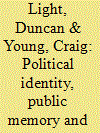| Srl | Item |
| 1 |
ID:
099638


|
|
|
|
|
| Publication |
2010.
|
| Summary/Abstract |
Three main factors explain public support for EU membership: utilitarian expectations, the role of values and ideas, and class partisanship. In the Polish case, public opinion polls and issues more specific to Poland, such as the role of the Catholic Church, populist political parties and profound Euroscepticism among farmers, suggest that although these theoretical explanations overlap, each of them has a different explanatory value. The economic approach remains the best predictor of support for EU membership, and whereas values and identity are closely linked to and dependent upon economic expectations, the impact of national politics appears largely decoupled from Polish Euroscepticism.
|
|
|
|
|
|
|
|
|
|
|
|
|
|
|
|
| 2 |
ID:
099639


|
|
|
|
|
| Publication |
2010.
|
| Summary/Abstract |
The literature on Europeanisation in relation to Eastern Europe has posited the material incentives of EU membership as the main driver of domestic reforms aimed at adopting EU rules and norms (conditionality). But this fails to explain puzzling instances where no EU rule exists yet domestic change happens under European influence, or where the rule is a condition yet has little impact. As repositories of (dis)information, transnational networks can embolden a candidate country to breach the rules or influence it to comply with the 'extra-conditionality' the networks themselves create out of their own agendas.
|
|
|
|
|
|
|
|
|
|
|
|
|
|
|
|
| 3 |
ID:
099637


|
|
|
|
|
| Publication |
2010.
|
| Summary/Abstract |
The article examines the deportation of ethnic Greeks from the Caucasus in 1949, their establishment in Kazakhstan, and their lives there. The main source is 20 in-depth interviews conducted in Greater Athens, Greece, to which the majority of the deportees migrated at various dates. The main conclusion is that no trauma could be detected among either the first or the second generation of exiles. The reasons for the lack of trauma include the low mortality experienced during the deportations and the significant improvement in the deportees' living standards after their arrival in Central Asia.
|
|
|
|
|
|
|
|
|
|
|
|
|
|
|
|
| 4 |
ID:
099636


|
|
|
|
|
| Publication |
2010.
|
| Summary/Abstract |
This article analyses the inter-relationship between political identity, public memory and urban space in South-east Europe through a case study of Parcul Carol I (Carol I Park) in Bucharest, Romania from 1906 to the present. The article analyses how the urban cultural landscape has been reshaped to support the political ambitions of three successive regimes-Romania as a kingdom and liberal constitutional monarchy (1881-1938); state-socialist Romania (1947-1989); and the post-socialist Romanian state from 1989. The article highlights complex continuity from the state-socialist period under post-socialism, rather than destruction of the landscape of state-socialism, combined with the return of pre-socialist landscape elements. The article argues for the need for studies of the fate of state-socialist urban landscapes under post-socialism which consider the complexities introduced by the persistence of landscape elements from the pre-socialist and state-socialist periods and their combination with pre-socialist and post-socialist landscapes to produce hybrid memory-scapes and spaces of the nation.
|
|
|
|
|
|
|
|
|
|
|
|
|
|
|
|
| 5 |
ID:
099635


|
|
|
|
|
| Publication |
2010.
|
| Summary/Abstract |
Political reforms and changes on the local level by the Putin-Medvedev leadership have resulted in an almost unprecedented turnover of leadership but they have aroused political conflict and even resistance by unsettling the political status quo throughout the 83 subnational units of the Russian Federation. The reforms have resulted in the marginalisation of the authority of city mayors, the recruitment from outside of chief executives of federation regions, and the polarisation of ethnic enclaves by national policies. Destabilising everything is the combination of a United Russia (Edinaya Rossiya) political party bent on national dominance, ambiguous liberal appeals and democratic reforms by President Medvedev, and a global economic recession.
|
|
|
|
|
|
|
|
|
|
|
|
|
|
|
|
| 6 |
ID:
099640


|
|
|
|
|
| Publication |
2010.
|
| Summary/Abstract |
The mid-1950s marked the beginning of tremendous growth in the Soviet Union's foreign economic relations. Based on archival research, this article argues that this growth masked two contradictory processes. On the one hand, Kremlin leaders encouraged ever more economic engagement with the world. On the other hand, the Soviet system discouraged industrial managers from producing for export, and it often caused precious imports to be wasted. This struggle between industry and the Kremlin over foreign trade gave impetus to the treadmill of reforms launched by the Khrushchev leadership.
|
|
|
|
|
|
|
|
|
|
|
|
|
|
|
|